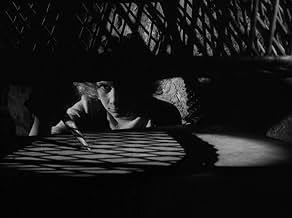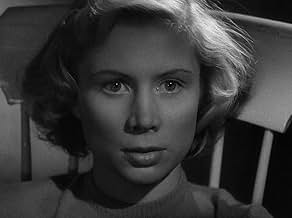AVALIAÇÃO DA IMDb
6,7/10
2,3 mil
SUA AVALIAÇÃO
Adicionar um enredo no seu idiomaA film director tries to create the best film in history, but finds out that human abilities have their limits.A film director tries to create the best film in history, but finds out that human abilities have their limits.A film director tries to create the best film in history, but finds out that human abilities have their limits.
Birgit Lindkvist
- Anna - inneboende på pensionatet
- (as Bibi Lindkvist)
John W. Björling
- En man i Birgitta Carolinas dröm
- (não creditado)
Sven Björling
- En filmarbetare i ateljén
- (não creditado)
Anita Blom
- Anna - Signes kusindotter
- (não creditado)
Britta Brunius
- Lasses mamma
- (não creditado)
Åke Engfeldt
- Ena kriminalpolisen
- (não creditado)
Gösta Ericsson
- Andra kriminalpolisen
- (não creditado)
Kenne Fant
- Arne - Skådespelare
- (não creditado)
Avaliações em destaque
An ex Maths teacher announces he's just been released from a lunatic asylum (as you do) to some people making a film. (He used to teach one of them). He says that he has ideas about the Devil. The filmmakers try to adapt those ideas into a screenplay. Apparently they reject those ideas -after making them - for this film presumably.
The meandering narrative seems to explore scenarios that surround some pretty miserable and uninteresting people. I think I read that it's Bergman's first film to look solely at mild horror and the place of the Devil, both in philosophy, film and in folklore. Suicide, alcoholism, prostitution, even drowning babies born to the under-aged get limp, clumsy and unconvincing treatment.
It's pretty impossible to follow and no doubt spoilt by knowing what gems came later from the Master of Darkness.
Best thing to come out of it was a line that I've slightly altered - "Life Itself is a terminal illness "
The meandering narrative seems to explore scenarios that surround some pretty miserable and uninteresting people. I think I read that it's Bergman's first film to look solely at mild horror and the place of the Devil, both in philosophy, film and in folklore. Suicide, alcoholism, prostitution, even drowning babies born to the under-aged get limp, clumsy and unconvincing treatment.
It's pretty impossible to follow and no doubt spoilt by knowing what gems came later from the Master of Darkness.
Best thing to come out of it was a line that I've slightly altered - "Life Itself is a terminal illness "
"Prison" (1949) is the first film in which Ingmar Bergman develops something like a style of his own.
We see various elements that reappear in later movies. There is the character of death (to reappear in "The seventh seal", 1957) and dreamsequences (to reappear in "Wild strawberries", 1957).
The most important sign for things to come is however the theme of the film. The film is about a director trying to make a film about a world governed by the devil. Is a world governed by the devil not very much like a wordl where God is silent? Later Bergman would make a trilogy around this theme consisting of the films "Through a glass darkly" (1961), "Winterlight" (1963) and "The silence" (1963).
So in "Prison" Bergman started to experiment with a personal style, but this style was not fully developed yet. There are good sequences (such as the dream sequence) but as a whole the film is somewhat cluttered and inaccessible. Moreover the film in a film format about a director struggling to make a film does not work very well in "Prison". It does work very well in "8,5" (1963, Federico Fellini), but the Bergman of 1949 is not the Fellini of 1963.
We see various elements that reappear in later movies. There is the character of death (to reappear in "The seventh seal", 1957) and dreamsequences (to reappear in "Wild strawberries", 1957).
The most important sign for things to come is however the theme of the film. The film is about a director trying to make a film about a world governed by the devil. Is a world governed by the devil not very much like a wordl where God is silent? Later Bergman would make a trilogy around this theme consisting of the films "Through a glass darkly" (1961), "Winterlight" (1963) and "The silence" (1963).
So in "Prison" Bergman started to experiment with a personal style, but this style was not fully developed yet. There are good sequences (such as the dream sequence) but as a whole the film is somewhat cluttered and inaccessible. Moreover the film in a film format about a director struggling to make a film does not work very well in "Prison". It does work very well in "8,5" (1963, Federico Fellini), but the Bergman of 1949 is not the Fellini of 1963.
Minor, depressing early Ingmar Bergman drama, bulit on an ambitious life-mirrors-art concept that doesn't really come off. It begins with the premise of a director being pitched the idea of making a film that depicts "Hell on Earth", but then the movie seems to try to prove this thesis via the story of some people involved in the filmmaking process. There is one notable extended dream sequence, but the most original touch is probably the spoken opening credits that never actually appear on the screen. It's a well-made and well-acted film, but one recommended mostly for dedicated Bergman followers. ** out of 4.
Entombed, constrained, confined, for the devil to feed upon and dine, in a world that never has been fair, we prance around as if we care, the battles rage, a constant fight, fair maidens walk the streets at night, the bottle stops us feeling pain, the new born child casually slain, our nightmares never let us sleep, Satan's slaves feeding the heap, trapped and cursed and punched and flogged, our lives lived out, with reality fogged.
The cells we cast around us and the barriers they enforce - it's a fascinating experience and contains some genuinely engaging performances but not the best the great man had created to date by a long chalk.
The cells we cast around us and the barriers they enforce - it's a fascinating experience and contains some genuinely engaging performances but not the best the great man had created to date by a long chalk.
The real prison is in the minds of these people, and in Bergman's in particular. Bergmann was always obsessed with depression and death; it was in all his fllms. Just like violence is in every Sergio Leone film, some directors are obsessed with one emotion or another. In this one, we find supposedly talented artists are having a difficult time with life. O poor little me! Get over it. People with real talent don't get despondent, they get to work. They may get down once in a while, but they bounce back from adversity, and overcome it. These wusses do not. They expect miracles from their mediocre talents and efforts, and are disappointed when they are not recognized as geniuses or great artists. You know how many years Bogart or Streep had to struggle before they became major stars? A lot longer than these no-talents. I hate agreeing with Woody Allen, but Bergmaaaaan is a joke; a bad joke at that. At least the photography is interesting.
Você sabia?
- CuriosidadesIngmar Bergman's first film based on his own original screenplay.
- Cenas durante ou pós-créditosThere are no opening titles in this film. An unseen narrator (Hasse Ekman) reads the credits, as well as the title, out loud approximately ten minutes in to the movie. The sole title card is the standard "Slut" (Swedish for "End") that closes the picture.
- ConexõesEdited into Histoire(s) du cinéma: Une histoire seule (1989)
- Trilhas sonorasDrömmen
Composed by Erland von Koch (1949)
Principais escolhas
Faça login para avaliar e ver a lista de recomendações personalizadas
- How long is Prison?Fornecido pela Alexa
Detalhes
Bilheteria
- Orçamento
- SEK 240.000 (estimativa)
- Tempo de duração1 hora 19 minutos
- Cor
- Mixagem de som
- Proporção
- 1.33 : 1
Contribua para esta página
Sugerir uma alteração ou adicionar conteúdo ausente
































